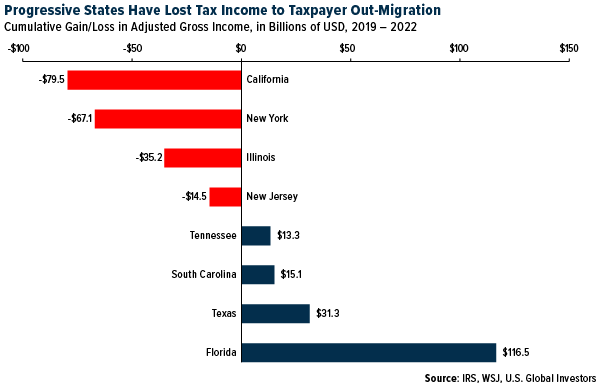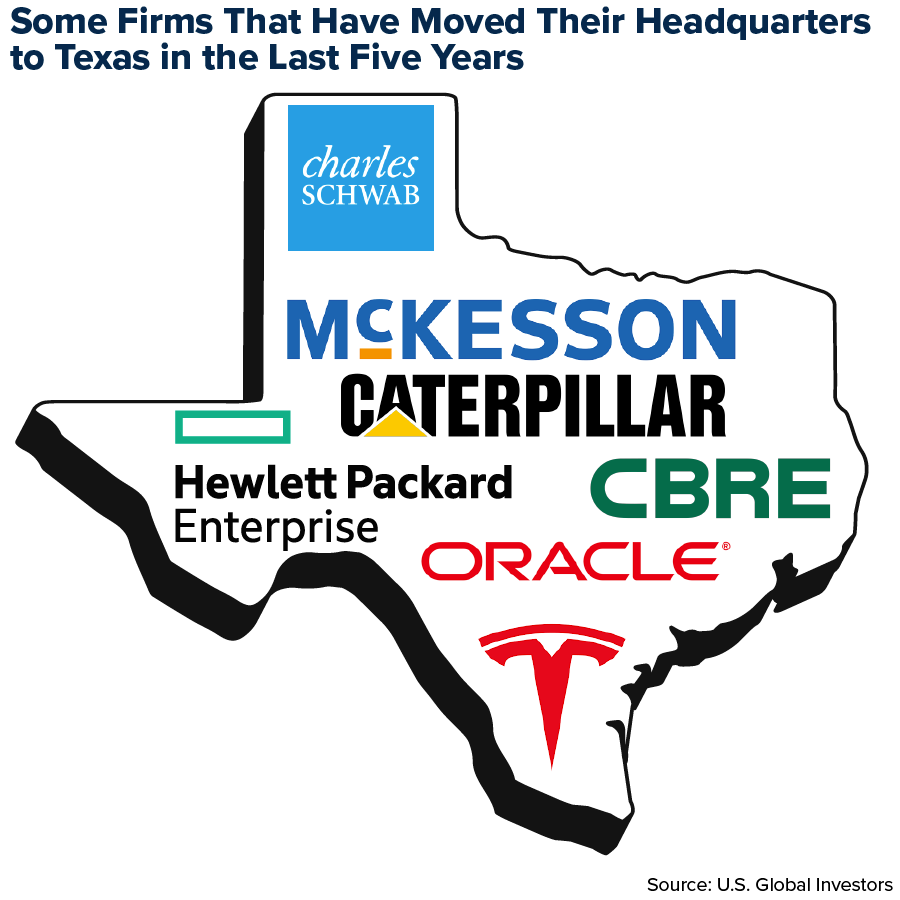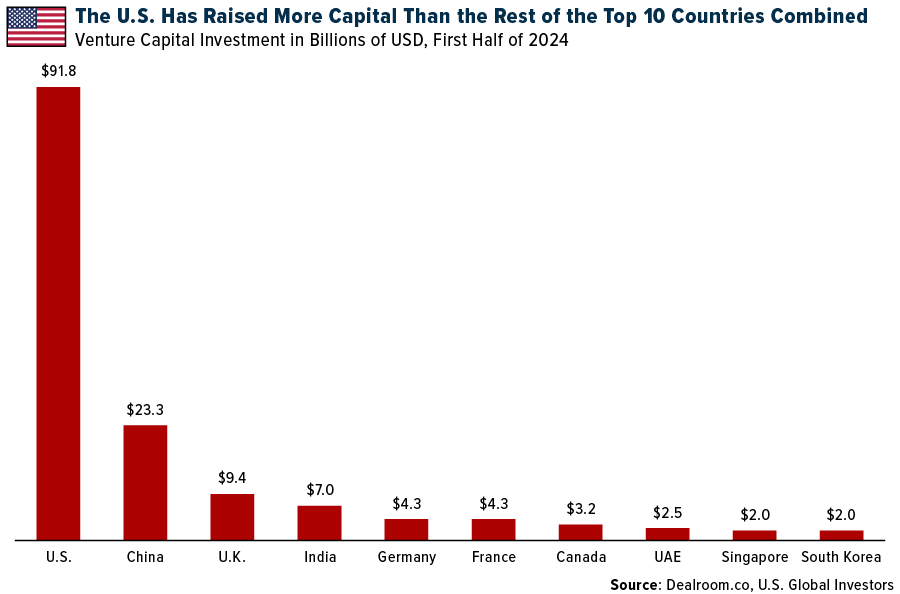Business-Friendly Policies Drive Corporate Relocations To Texas
A seismic shift is taking place in corporate America as even more companies announce plans to relocate from blue states to more business-friendly jurisdictions like Texas.
Last week, Elon Musk announced he would be moving the headquarters of two of his companies, X and SpaceX, from California to Texas. The “final straw,” according to Musk, was a new California law that blocks schools from notifying families if students change their gender identity.
But the underlying reasons for this ongoing migration go far deeper than one bad law.
The Great Corporate Migration
Simply put, high living costs and operating costs in select metro areas are prompting companies to seek greener pastures elsewhere. A staggering 465 headquarters have moved since 2018, with Texas welcoming the most at 209 relocations, according to commercial real estate firm CBRE (which itself moved from Los Angeles to Dallas in 2020).
By contrast, 79 companies left California’s Bay Area over the same period, 50 departed from Los Angeles and 21 moved away from New York City.
California’s losses are Texas’s gains. Between 2019 and 2022, the Golden State lost nearly $80 billion in tax revenue as residents fled high living costs and burdensome regulations, while Texas gained $31 billion (and Florida a whopping $116 billion). In 2022 alone, California lost about three times as much income to other states as it did in 2019.

This trend has had tangible impacts. San Francisco’s office vacancy rate nearly doubled from 17% in March 2021 to 32% today. That’s well ahead of the vacancy rates in similarly impacted cities such as L.A. (27%), Seattle (22%) and New York (18%).
Energy Costs And Mandates Burden California Businesses
If a business continued to lose customers quarter after quarter, it might consider reducing prices or improving services.
Not so with progressive states, which are doubling down on policies that only drive costs higher. Increased climate mandates and taxes are set to raise California energy costs—already among the highest in the U.S.—while a new $20-an-hour minimum wage for fast-food workers has led to a jump in restaurant prices.
In stark contrast, Texas has a relatively low cost of living and low energy costs. It has no personal or corporate income tax. Nearly every year since 2001, it’s topped Chief Executive’s survey of the best states for business in 2024. California, meanwhile, has remained at the bottom behind New York, Illinois and New Jersey.
Today, Texas is home to 55 Fortune 500 companies, the highest number in any state. Major firms like Oracle, Hewlett Packard Enterprise (HPE) and Charles Schwab have relocated their headquarters to the Lone Star State since the pandemic began, a move that CBRE says can help save a company 15% to 20% in employee wages.

Tech Leaders Lining Up Behind Trump
Elon Musk’s move out of California is more than a business decision; it’s also political. The Tesla chief has increasingly aligned himself with the conservative movement, and last week, he endorsed former President Donald Trump and pledged to donate around $45 million a month to a pro-Trump super PAC.
This shift reflects a broader recent trend of prominent Silicon Valley figures throwing their weight behind Trump, especially since he tapped former venture capitalist and first-term senator J.D. Vance as his running mate.
Marc Andreessen and Ben Horowitz, founders of the legendary venture capital firm Andreessen Horowitz, have also announced their support of Trump. They reportedly told staff that they intend to contribute money to pro-Trump political organizations, believing that the ex-president would do more than Joe Biden to help startups.
Writing in a July 5 blog post, Andreessen and Horowitz said they plan to support candidates who support “Little Tech” —their term for tech startups. Startups are the “vanguard of American technology supremacy,” and yet there’s a strong “anti-startup bias… across the American government” right now. The way to foster continued economic growth in the U.S., Andreessen and Horowitz insist, is to “encourage new startups—to drive innovation, competition and growth—and to prevent big companies from weaponizing the government to crush them.”
The U.S. remains the world’s largest hub for VC investment. According to startup data provider Dealroom.co, the U.S. raised close to $92 billion in the first half of this year, significantly more than the next nine countries combined. The U.S. is home to six of the world’s top 10 tech hubs by the amount of VC raised, with the Bay Area topping the list at almost $34 billion raised so far in 2024.

Vance To Bridge Trump And Silicon Valley?
Let’s talk about J.D. Vance for a moment. The 39-year-old Ohio senator, who authored the bestselling memoir Hillbilly Elegy in 2016, has seen a rapid ascent in U.S. politics. A graduate of Yale Law School and a former venture capitalist, Vance has used his background to bridge the gap between the Trump campaign and wealthy Silicon Valley donors. Despite his VC background, the lawmaker is an outspoken critic of Big Tech and has called for the breakup of Google, which he named “one of the most dangerous companies in the world.”
Trump, Vance’s would-be boss, has increasingly supported cutting-edge tech that he once criticized, including Bitcoin, artificial intelligence and non-fungible tokens (NFTs). Slated to speak later this week at the Bitcoin Conference in Nashville, Trump is the first major presidential candidate to accept crypto donations. His campaign said it collected $3 million in crypto last quarter.
Trump hasn’t named who will lead his administration’s policymaking on AI if he rewins the presidency, but I believe Vance could play a major role in this growing industry. Allies of Trump have reportedly drafted an AI executive order aimed at boosting military technology and reducing AI regulations. The plan, titled “Make America First in AI,” signals a dramatic potential shift in AI policy under a future Trump administration.
More By This Author:
Biden’s Election Troubles And The Market Implications
Why Commodities Like Silver, Oil And Gold Are Soaring Amid Inflation
Top Mining Companies Commit Billions To Zambia’s Copper Industry



